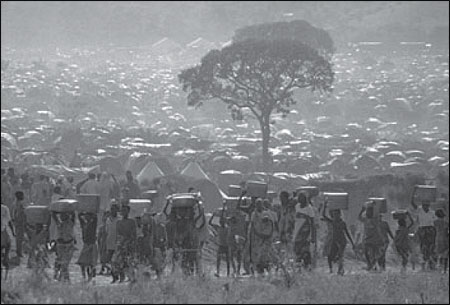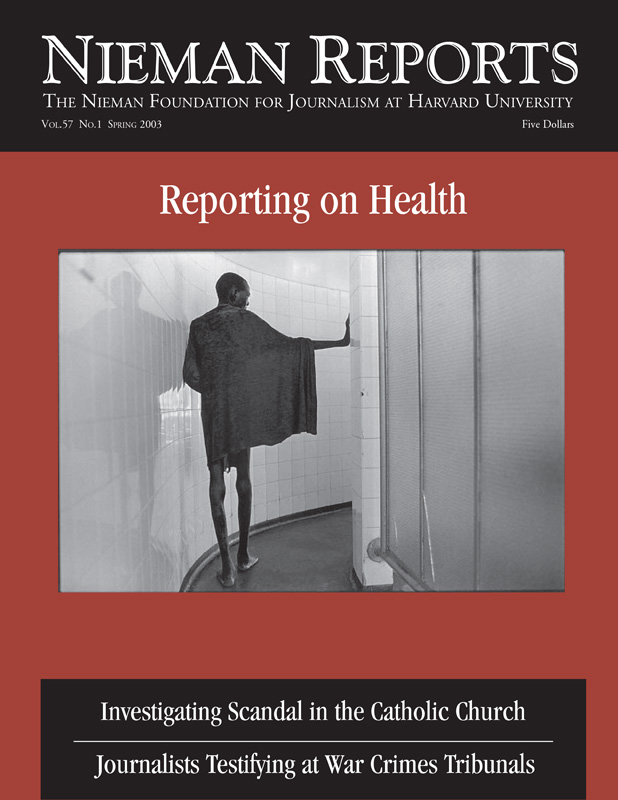
Refugees carrying water containers make their way back to their huts at the Benaco Refugee Camp in Tanzania near the Rwandan border in May 1994. Photo by Karsten Thielker/The Associated Press.
In June 1994, I was in Rwanda reporting on the genocide that would claim the lives of half a million ethnic Tutsis in three months of concentrated slaughter. In a rubble-strewn, rebel-held town called Kabuga, on the outskirts of Kigali, the Rwandan capital, I met a group of admitted members of the Interahamwe militia—“those who attack together”—the Hutu death squads that had stabbed, clubbed and hacked to death their friends, neighbors and even relatives in the weeks just prior to our meeting.
The massacres were still unfolding in the south. Hundreds of dazed survivors, some of them wrapped in gauze that barely concealed their hideous machete wounds, loitered amid the wreckage of their lives in the looted and gutted ruins nearby. The young militiamen had just recently been detained by the Tutsi-led rebel army known as the Rwandan Patriotic Front (RPF), which now controlled the area.
Why did they do it, I asked? How could ordinary men like these participate in such a monstrous crime?
“The government always told us that the RPF was Tutsi, and if it wins the war, all the Hutus will be killed,” one of them replied. His name was Emmanuel, 18 years old. Sullen and withdrawn, he wore a mangy purple corduroy jacket, blue jeans, and plastic high-top sneakers. “At the time,” he said, “because it was the government saying so, using the radio and, because I had not known the RPF before, I believed that the government was telling the truth.”
Another added, “They were always telling people that if the RPF comes, it will return Rwanda to feudalism, that they would bring oppression.”
A third put it this way: “I did not believe the Tutsis were coming to kill us and take our land, but when the government radio continued to broadcast that the RPF is coming to take our land, is coming to kill the Hutus—when this was repeated over and over, I began to feel some kind of fear.”
Telling What One Has Seen
Five years after this encounter, in 1999, a prosecutor for the United Nations International Criminal Tribunal for Rwanda visited me in New York. He asked if I would be willing to testify against Colonel Theoneste Bagosora, by most accounts the top conspirator in the genocide—Rwanda’s Himmler. He told me that the article I produced from those interviews in 1994, which appeared in The New Republic, was the only piece ever published that quoted admitted participants in the genocide blaming the government’s radio propaganda for their conduct. My testimony, the prosecutor told me, could provide an indispensable link between Colonel Bagosora’s military regime and the actual perpetrators of the genocide.
I was flattered to be asked to testify and to be told I could help to convict a war criminal of such magnitude. After years of reporting on ethnic conflict in Africa, I was convinced that a culture of impunity for political crimes was a fundamental problem that brought out the worst in the continent’s leaders and selected far the worst among them, making huge-scale mass slaughter possible. Bringing men like Colonel Bagosora to justice, I believed, could have a major impact, not least by illuminating how Africa’s ruinous conflicts were the product not of ancient, exotic hatreds but of calculated tyranny.
And, too, it occurred to me that participating in such a trial could provide a fascinating inside look at a historic proceeding, perhaps well worth writing about at some point. I was a freelance writer at the time, completing a book about Africa that concludes with a chapter on the Rwanda tribunal. I didn’t feel bound by the constraints that might properly apply to newspaper correspondents. So I agreed to testify.
But it would be three more years before Bagosora’s trial began. Meantime, the prosecutor who wanted me to testify left the tribunal, and I moved to The New York Times as an editorial writer. For reasons that were never clear, the matter of my testimony was eventually dropped. Had the new prosecutors really wanted me to testify, by then I would probably have declined.
One reason is that I was now in a position to be writing editorials about the tribunal, and in fact I did write a number of editorials that were critical of the tribunal on procedural grounds. Even aside from the Times’s institutional concerns, which I respect, I couldn’t see participating in a trial and maintaining the kind of journalistic detachment required even of an editorial writer. By that I don’t mean detachment in response to genocide. I mean detachment with regard to a judicial proceeding that might or might not represent an adequate international response to genocide, depending on the quality of justice it provides.
Moreover, as I have talked to other journalists and followed the burgeoning debate on this problem—there was virtually no debate underway when I was first approached—I have begun to take more seriously the responsibilities even of a freelance author toward his or her colleagues and the profession as a whole. I believe that the perception of journalists as potential arms of a criminal prosecution should be avoided at all costs, not least for the safety of future war correspondents and for their ability to do work that ultimately is as essential to the pursuit of truth as any criminal proceeding is likely to be.
It is important to stress that I was not subpoenaed to testify, as The Washington Post’s Jonathan Randal was. I was simply invited. I would have contested a subpoena. I believe there might be extraordinary circumstances in which a journalist could well be persuaded to testify if he or she has unique and invaluable evidence that can be gotten nowhere else. But that should be the exceptional case, and the decision should be the journalist’s own.
I teach a master’s-level writing seminar at Columbia University’s School of International and Public Affairs. Each year we have a lively discussion of this issue. My students are often dumfounded by my assertion of a journalist’s allegiance to a necessarily independent calling. Many abhor the notion of a writer who, in a crisis, adheres to Ruskin’s seemingly cynical injunction: “Does a man die at your feet, your business is not to help him, but to note the color of his lips.”
“Is a journalist not a human being?” my students ask.
My answer is that journalism, my life’s work, is an expression of my humanity and the best contribution I have to make to justice as well as truth.
Bill Berkeley is a reporter for The New York Times and the author of “The Graves Are Not Yet Full: Race, Tribe and Power in the Heart of Africa” (Basic Books, 2002). He was previously an editorial writer for the Times, and for more than a decade he reported on African affairs for The Atlantic Monthly, The New Republic, The New York Times Magazine, and The Washington Post.



